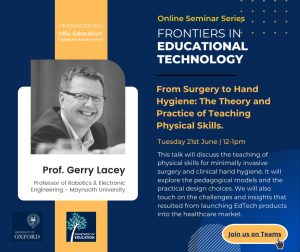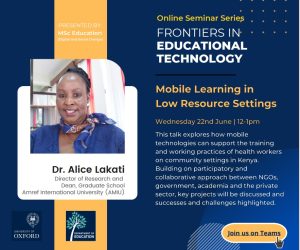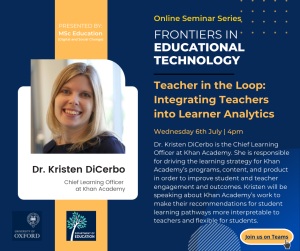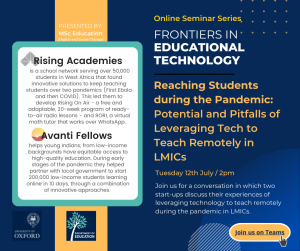Frontiers in Educational Technology
Export to calendarBio
Convenors: Niall Winters, Carmen Hoepper, Zou Xinyi, Owen Henkel
| Date | Time | Speaker | Speaker Info | Theme |
|---|---|---|---|---|
| Tue 21 June | 12.00-13.00 | Gerry Lacey | Professor of Robotics and Electronic Engineering | EdTech Healthcare Product Design: Challenges and Insight |
| Wed 22 June | 12.00-13.00 | Alice Lakati | Director of Research, Amref International University (AMIU) | Mobile Learning in low resource settings |
| Tue 28 June | 14.00-15.00 | Taskeem Adam | Senior Research Lead at EdTech Hub | Tackling coloniality in EdTech: Addressing digital neo-colonialism in MOOCs |
| Thu 30 June | 12.00-13.00 | Bernie Hogan | Senior Research Lead at the OII | The use of personal network approaches in teaching – pitfalls and potentials |
| Wed 6 July | 16.00-17.00 | Kristen DiCerbo | Chief Learning Officer at Khan Academy | Learning Design in a Digital Space |
| Tue 12 July | 14.00-15.00 | Rising Academies and Avanti Fellows | EdTech Start Ups | Reaching students during the pandemic: potential and pitfalls of leveraging tech to teach remotely in LMICs |
| Thu 14 July | 10.00-11.00 | Neil Selwyn | Distinguished Professor of Education, Monash University | Rethinking the digitization of education in an era of climate crisis |
Online Seminar Series
Frontiers in educational technology
The educational landscape is vast but where does technology sit in this complex field? Can we design responsible and sustainable EdTech? What is the roles of public and private players in this sector? What are the challenges facing mobile learning in low resource settings?
Join us for a series of online seminars this summer as we discuss these topics (and more) with leading experts in the field.
21 June – 14 July, 2022
Talk Summary
Gerry Lacey
(Professor of Robotics & Electronic Engineering – Maynooth University)
From surgery to hand hygiene: The theory and practice of teaching physical skills.
Tuesday 21st June | 12-1pm
- This talk discusses the teaching of physical skills for minimally invasive surgery and clinical hand hygiene. It will explore the pedagogical models and the practical design choices. We will also touch on the challenges and insights that resulted from launching EdTech products into the healthcare market.
- Teams Meeting Link
Alice Lakati
(Director of Research – Amref International University (AMIU))
Mobile Learning in Low Resource Settings
Wednesday 22nd June | 12-1pm
- This talk explores how mobile technologies can support the training and working practices of health workers on community settings in Kenya. Building on participatory and collaborative approach between NGOs, government, academia and the private sector, key projects will be discussed and successes and challenges highlighted.
- Teams Meeting Link
Taskeen Adam
(Senior Research Lead at EdTech Hub)
Tackling Coloniality in EdTech: Addressing digital neo-colonialism in MOOCs
Tuesday 28th June | 2-3pm
- Dominant MOOC platforms created by Western universities tend to embed Western-centric epistemologies and propagate this without questioning their global relevance. Consequently, such MOOCs can be detrimental when educating diverse and complex participants as they erode local and indigenous knowledge systems. This talk draws parallels between colonial education, specifically across Sub-Saharan Africa, and ‘digital neocolonialism’ through Western MOOC platforms.
- Teams Meeting Link
Bernie Hogan
(Senior Research Fellow at the Oxford Internet Institute)
The Use of Personal Network Approaches in Teaching – Pitfalls and Potentials
Thursday 30th June | 12 -1pm
- Networks are not mere manifestations of social structure, but selective representations. Who gets represented, how they are presented, and how this works within a classroom setting is an important and regular part of this conversation. This talk discusses the specific issue of showing a social network in a classroom that includes the people in the class. Dr. Hogan articulates this approach as a microcosm of how to engage and dialogue about representing and feedbacking data to a class as well as understanding how data inequality can be perpetuated.
- Teams Meeting Link
Kristen DiCerbo
(Chief Learning Officer at Khan Academy)
Teacher in the Loop: Integrating Teachers into Learner Analytics
Wednesday 6th July | 4pm
- Kristen DiCerbo is the Chief Learning Officer at Khan Academy, a non-profit dedicated to providing a free world class education to anyone, anywhere. She is responsible for driving the learning strategy for Khan Academy’s programs, content, and product in order to improve student and teacher engagement and outcomes. Kristen will be speaking about Khan Academy’s work to make their recommendations for student learning pathways more interpretable to teachers and flexible for students.
- Teams Meeting Link
Rising Academies and Avanti Fellows
(EdTech Start Ups)
Reaching students during the pandemic: potential and pitfalls of leveraging tech to teach remotely in LMICs
Tuesday 12th July | 2pm
- Join us for a conversation in which two start-ups discuss their experiences of leveraging technology to teach remotely during the pandemic in LMICs.
- Rising Academies is a school network serving over 50,000 students in West Africa that found innovative solutions to keep teaching students over two pandemics (First Ebola and then COVID). This led them to develop Rising On Air – a free and adaptable, 20-week program of ready-to-air radio lessons – and RORI, a virtual math tutor that works over WhatsApp.
- Avanti Fellows helps young Indians, from low-income backgrounds have equitable access to high-quality education. During early stages of the pandemic they helped partner with local government to start 200,000 low-income students learning online in 10 days, through a combination of innovative approaches.
Teams Meeting Link
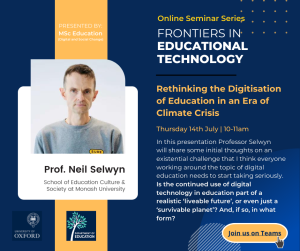
Neil Selwyn
(School of Education Culture & Society – Monash University)
Rethinking the Digitisation of Education in an Era of Climate Crisis
Thursday 14th July | 10-11am
- In this presentation Professor. Selwyn will share some initial thoughts on an existential challenge that I think everyone working around the topic of digital education needs to start taking seriously. Is the continued use of digital technology in education part of a realistic ‘liveable future’, or even just a ‘survivable planet’? And, if so, in what form?
- Teams Meeting Link







